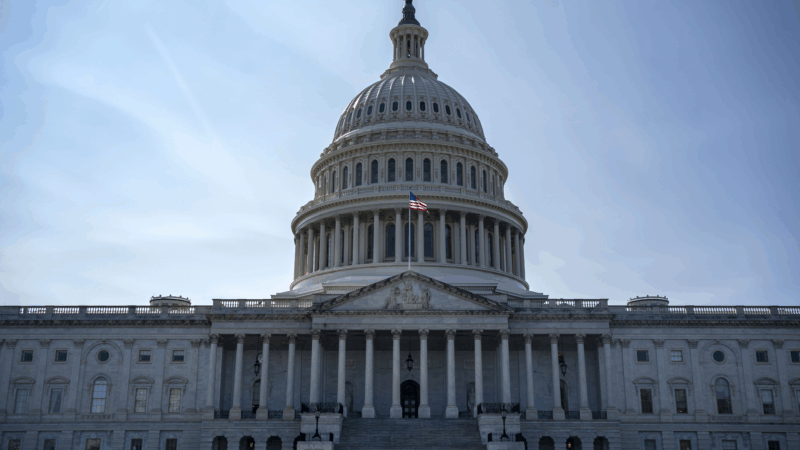DOGE tried assigning a team to the Government Accountability Office. They refused
The Department of Government Efficiency is continuing its attempts to expand its reach beyond executive branch agencies, this time seeking to embed in an independent legislative watchdog that finds waste, fraud and abuse in the government.
But the U.S. Government Accountability Office, a legislative branch entity that helps audit government spending and suggest ways to make it more efficient, rejected that request on Friday by noting that GAO is not subject to presidential executive orders.
The request to GAO had cited President Trump’s Jan. 20 executive order creating DOGE, which, despite its name, is not a formal agency.
DOGE’s request to GAO and its response was first reported by NOTUS.
A spokesperson for GAO confirmed DOGE’s outreach, and reiterated that “as a legislative branch agency, GAO is not subject to Executive Orders and has therefore declined any requests to have a DOGE team assigned to GAO.”
In an announcement to employees posted Friday afternoon, GAO leadership said they sent a letter to Acting Administrator of DOGE Amy Gleason and notified members of Congress, according to a copy of the notice shared with NPR by an employee not authorized to speak publicly.
The GAO regularly releases reports that highlight ways to improve government efficiency, like a May 13 review of federal programs with fragmented, overlapping, or duplicative actions it says could save over $100 billion in spending. But there’s been little overlap between GAO’s work and DOGE’s actions so far.
“DOGE’s attempted intrusion into an independent, nonpartisan legislative branch agency is a direct assault on our nation’s sacred separation of powers,” said Rep. Gerry Connolly, D-Va., top Democrat on the House Oversight Committee, which oversees GAO, in a statement to NPR. “DOGE cannot and must not have any access to GAO. Oversight Democrats are monitoring this situation closely and stand behind GAO’s well-established status as a critical legislative branch agency.”
The White House did not immediately respond to a request for comment about DOGE’s attempts to place a team at GAO.
It’s not the first time DOGE has sought to embed staffers at an organization outside of the executive branch. In recent weeks, DOGE representatives have been in contact with several privately incorporated nonprofits that were created by Congress and receive federal funding but are not considered government agencies, as well as at least one nonprofit that was established with no relationship to Congress.
DOGE tried to assign a team to review operations at the Corporation for Public Broadcasting in April, a day after Trump attempted to fire three board members, according to filings in a lawsuit brought by CPB challenging Trump’s move.
CPB denied that request, citing federal law stating that the organization “will not be an agency or establishment of the United States Government.”
DOGE’s efforts went even further when it approached the Vera Institute of Justice, a private nonprofit that has received federal grants, but was not created by Congress, about assigning a team there.
In an Apr. 15 call with Vera Institute leadership, a DOGE representative said DOGE’s outreach was about interrogating “every institute or agency that has Congressional monies appropriated to it,” according to notes Vera Institute staff shared with NPR.
After Vera staff told the DOGE representative that the Department of Justice had terminated the organization’s grants, he said his request to embed into Vera was “void.”
DOGE’s efforts to embed at GAO also heighten growing tensions between Congress and the executive branch. Last week, President Trump abruptly fired the Librarian of Congress, a year before the end of her term — raising concerns from members of Congress including Senate Majority leader John Thune.
Do you have information about DOGE outreach to independent agencies and nongovernmental organizations? Reach out to the authors through encrypted communications on Signal. Stephen Fowler is available on Signal at stphnfwlr.25. Shannon Bond is at shannonbond.01. Please use a nonwork device.
House Dem. Leader Jeffries responds to air strikes on Iran by U.S. and Israel
NPR's Emily Kwong speaks to House Minority Leader Hakeem Jeffries (D-NY), who is still calling for a vote on a war powers resolution following a wave of U.S.- and Israel-led airstrikes on Iran.
Iran’s Ayatollah Ali Khamenei is killed in Israeli strike, ending 36-year iron rule
Khamenei, the Islamic Republic's second supreme leader, has been killed. He had held power since 1989, guiding Iran through difficult times — and overseeing the violent suppression of dissent.
Found: The 19th century silent film that first captured a robot attack
A newly rediscovered 1897 short by famed French filmmaker Georges Méliès is being hailed as the first-ever depiction of a robot in cinema.
‘One year of failure.’ The Lancet slams RFK Jr.’s first year as health chief
In a scathing review, the top US medical journal's editorial board warned that the "destruction that Kennedy has wrought in 1 in office might take generations to repair."
Here’s how world leaders are reacting to the US-Israel strikes on Iran
Several leaders voiced support for the operation – but most, including those who stopped short of condemning it, called for restraint moving forward.
How could the U.S. strikes in Iran affect the world’s oil supply?
Despite sanctions, Iran is one of the world's major oil producers, with much of its crude exported to China.




